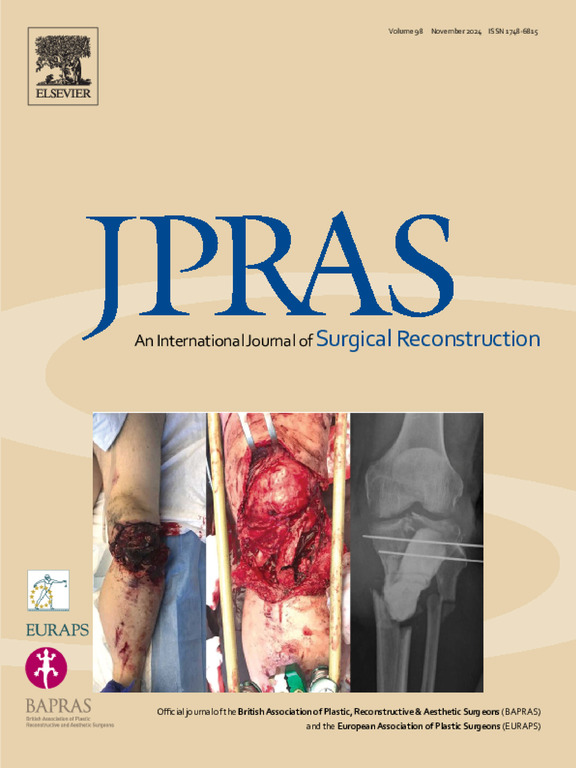肱动脉后穿孔器皮瓣的动态解剖研究:美学改进和临床效果。
IF 2
3区 医学
Q2 SURGERY
Journal of Plastic Reconstructive and Aesthetic Surgery
Pub Date : 2024-09-11
DOI:10.1016/j.bjps.2024.08.079
引用次数: 0
摘要
背景:鉴于腋窝重建对上肢活动功能的影响,腋窝重建是一项外科挑战。肱骨后皮瓣是这一适应症的首选方案,可提供精细和功能性局部重建,但人们对其穿孔知之甚少。本研究旨在确定穿孔器的位置,分析灌注流和链接血管的分布,并通过内侧化皮瓣以隐藏供体部位的美学瘢痕,对手术技术提出美学改进建议:方法:采集并解剖 15 具新鲜尸体。方法:采集并解剖 15 具新鲜尸体,在其中 26 只手臂上注射亚甲蓝。两只手臂注射不透射线染料。为完成分析,进行了动态(四维)计算机断层扫描血管造影:穿孔以手臂后轴为中心,灌注面积从82.2到142.9平方厘米不等,中位数为112.7(96.7-125.6)平方厘米。基底的中位长度平均为 83 毫米(65-91 毫米)。源血管出现处的直径平均为 1.43 毫米(1.27-1.61 毫米)。桨的远端距离肩胛骨平均为 10.7 厘米(7.8-12.2 厘米)。扫描结果显示,手臂内侧的穿孔直接连接血管,这表明可以将皮瓣内侧化:结论:肱骨后皮瓣具有恒定的穿孔。结论:肱骨后皮瓣具有恒定的穿孔,可以比之前描述的更内收,以改善美学效果,同时保持可重复性和令人满意的血管可靠性。本文章由计算机程序翻译,如有差异,请以英文原文为准。
Dynamic anatomical study of the posterior brachial artery perforator flap: Aesthetic refinement and clinical results
Background
Reconstruction of the axillary fossa represents a surgical challenge given the functional implications for mobility of the upper limb. The posterior brachial flap is a solution of choice for this indication, providing fine and functional local reconstruction, but little is known about its perforasome. This study aimed to identify the location of the perforator, analyze perfusion flow, and link vessel distribution, and propose an aesthetic refinement to the surgical technique by medializing the skin paddle to conceal aesthetic scarring at the donor site.
Methods
Fifteen fresh cadavers were harvested and dissected. Twenty-six arms were injected with methylene blue. Two arms were injected with radiopaque dye. A dynamic (4-dimensional) computed tomographic angiography was performed to complete the analysis.
Results
The perforasome was centered on the posterior axis of the arm with a perfusion area ranging from 82.2 to 142.9 cm², with a median of 112.7 (96.7–125.6) cm². The median length of the pedicle was 83 mm on an average (65–91 mm). Its caliber at the emergence of the source vessel had a mean diameter of 1.43 mm (1.27–1.61 mm). The distal limit of the paddle was located on an average 10.7 cm from the olecranon (7.8–12.2 cm). The scans showed direct linking vessels toward the perforasomes on the medial side of the arm, suggesting that it is possible to medialize the cutaneous paddle.
Conclusion
The posterior brachial flap presents with a constant perforasome. It can be harvested more medially than previously described to improve the aesthetic results, while maintaining reproducibility and satisfactory vascular reliability.
求助全文
通过发布文献求助,成功后即可免费获取论文全文。
去求助
来源期刊
CiteScore
3.10
自引率
11.10%
发文量
578
审稿时长
3.5 months
期刊介绍:
JPRAS An International Journal of Surgical Reconstruction is one of the world''s leading international journals, covering all the reconstructive and aesthetic aspects of plastic surgery.
The journal presents the latest surgical procedures with audit and outcome studies of new and established techniques in plastic surgery including: cleft lip and palate and other heads and neck surgery, hand surgery, lower limb trauma, burns, skin cancer, breast surgery and aesthetic surgery.

 求助内容:
求助内容: 应助结果提醒方式:
应助结果提醒方式:


